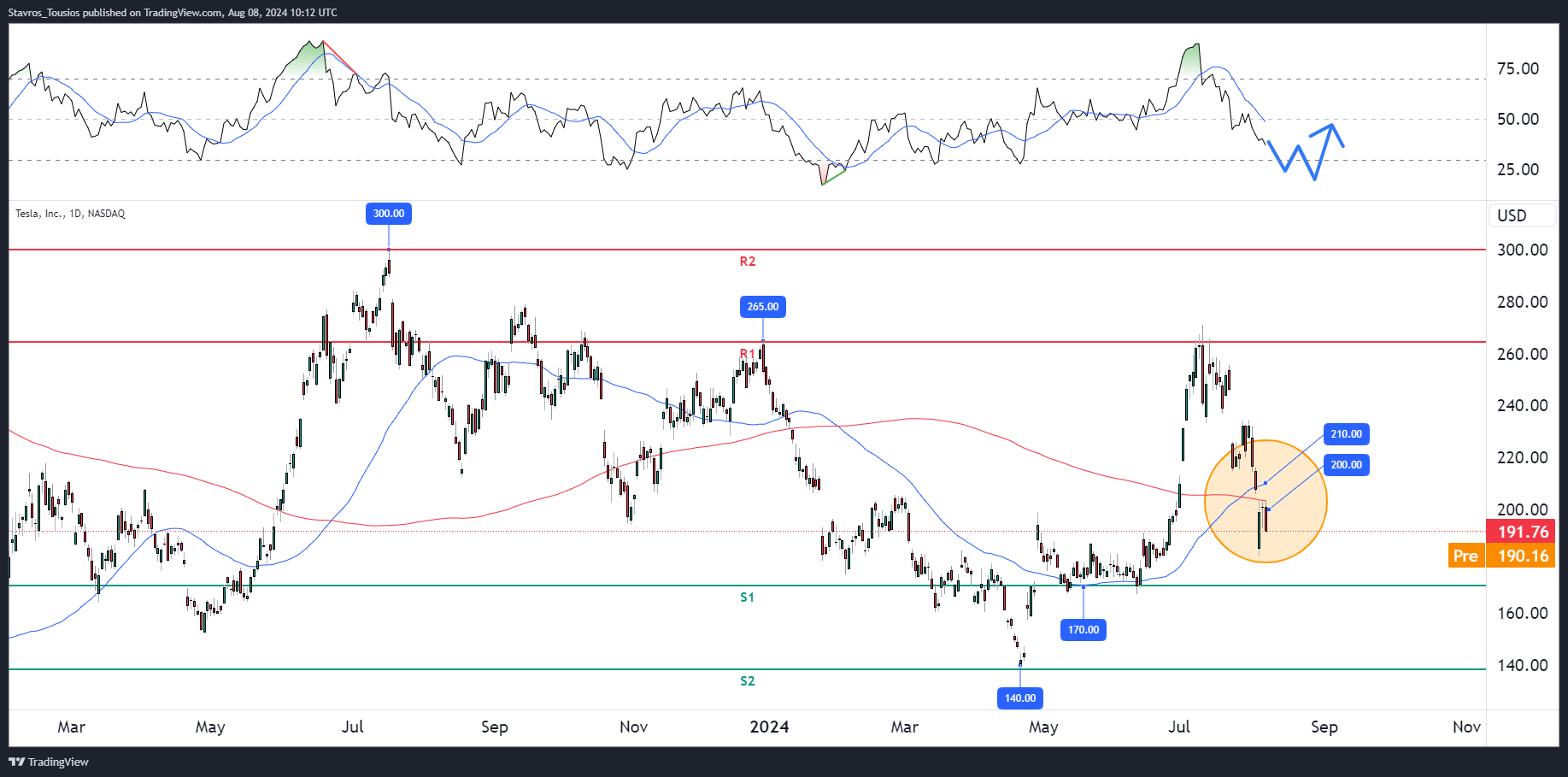Source: Iv-olga / Shutterstock.com
Tesla’s (NASDAQ:TSLA) stock has been on a rollercoaster ride over the past few months. Since April, it has nearly doubled in price to $270 per share but could not hold, reversing to under $200 per share. This price turned it into one of Tesla’s resistance levels that investors considering long positions want to watch.
The electric vehicle giant’s price action resulted in a Golden Cross between its 50-day and 200-day moving averages (MAs). Understanding what might be next becomes crucial as the 200-day MA has turned into resistance. This has formed a stronger barrier to upward momentum when combined with the $200 price tag. Notably, Tesla stock currently trades below both its MAs.
Investors can better understand Tesla’s potential course of action by examining both its resistance and support levels. Combined with a look at the company’s financials, we examine whether Tesla has the strength to break through its resistance levels and reach new heights.
Tesla Resistance Levels Matter
Tesla’s resistance levels are crucial for investors and traders who are considering a long position. However, resistance levels are better used to identify potential targets and zones where Tesla may slow down for a pullback or reverse. Tesla’s support levels, on the other hand, represent price points at which investors and traders may enter a long position. Tesla’s resistance and support levels allow better-informed decisions on entry and exit points.
Analyzing past behavior at these levels can provide valuable context. When evaluating Tesla’s price action and potential breakout scenarios, investors have multiple resistance and support types to consider. As the chart below shows, Tesla’s recent encounters with horizontal and MA resistance levels have resulted in price pullbacks.

 Source: TradingView
Source: TradingView
Key Tesla resistance levels can be seen at $200 per share (200-day MA), $210 per share (50-day MA), $265 per share (horizontal resistance) and $300 per share (2024 peak, round resistance). On the flip side, Tesla support levels to consider entering can be seen at $170 per share (50-day MA low), $140 per share (swing support) and $100 per share (2023 low, round support). Notably, Tesla support levels can also be utilized as stop-loss levels.
However, for Tesla to break current resistance levels, strong financial performance and positive market sentiment are essential.
Can Tesla Break Higher?
Market sentiment around Tesla appears positive, driven by strong second-quarter delivery numbers. Tesla’s revenue grew, its profit margin entered double-digit territory, and return on equity (ROE) came in over 20%. These strong fundamentals could support a sustained price increase.
According to RBC analysts, the increase in full-self-driving (FSD) subscriptions is seen as a catalyst for substantial upside should Tesla lower prices. Tesla’s plans to expand its energy business are also panning out, with a partnership with Sunrun in Texas. However, Tesla is increasingly viewed as an Artificial Intelligence (AI) and Robotics firm. This adds weight to the upcoming Robotaxi event in October as Tesla may join the large userbase of Uber (NYSE:UBER).
Additionally, momentum in Tesla’s stock price appears to be near its bottom. The Relative Strength Index (RSI) shows a value near 30%, implying Tesla stock may be undervalued soon. A high trading volume during an upward price movement may indicate strong buying pressure. This may increase the likelihood of breaking through resistance levels. Such price action could confirm the Golden Cross.
Baseline Scenario: Cautiously Optimistic
Tesla’s strong financial performance and market sentiment provide a favorable backdrop for a long position. The Golden Cross reveals good potential for a bullish trend.
Traders may effectively manage long positions by entering at the 50-day MA of $170 per share and aiming for initial exits at $200, followed by $265 and $300. Setting a stop-loss at $140 ensures downside protection while monitoring their RSI to help adapt to potentially changing market conditions.
This long position accommodates short-term volatility, as prices are trading below both MAs and the $200 per share round resistance level. However, should the price cross above this particularly strong Tesla resistance level sooner rather than later, investors may want to consider entering long after the $200 resistance turns into support.
On the date of publication, Stavros Tousios did not have (either directly or indirectly) any positions in the securities mentioned in this article. The opinions expressed in this article are those of the writer, subject to the InvestorPlace.com Publishing Guidelines.
On the date of publication, the responsible editor did not have (either directly or indirectly) any positions in the securities mentioned in this article.










